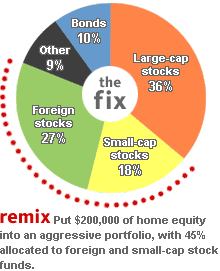|
Cashing in on hot real estate
The Handel-Laports spent a lot building a family. Now they have a valuable home but not much cash.
NEW YORK (MONEY Magazine) - Nelson Handel and Elicia Laport were doing okay money-wise early in their marriage, but their decision to become parents -- and the ensuing odyssey through fertility treatments and eventually adoption -- cleaned them out. Now Charlie is five, and Laport, a television-commercial producer, and Handel, an author and freelance journalist, are playing catch-up. The couple, both 46, have just $100,000 in their retirement accounts, so they need to save and invest aggressively, a prospect Handel finds daunting: "I'm risk-averse when it comes to playing with the stability of our lives." Where are they now?
The couple make $120,000 or more a year depending on Handel's assignments, and Laport puts 6 percent of her salary into a 401(k) matched dollar for dollar by her employer. They also have one extremely valuable asset: a house in the now trendy Silverlake neighborhood of Los Angeles that's worth $1 million, nearly four times what they paid in 1995. The equity, Handel says, is "lovely," but it's not doing them much good right now. Meanwhile, as mortgage rates are rising, the couple are headed into the year when their $250,000 adjustable-rate loan will be adjusted upward. Rates are already up on their $30,000 home-equity line and $12,000 credit-card debt. What they should do
San Diego-based certified financial planners Christopher Van Slyke and Terry Green recommend an unconventional plan: taking out a new $500,000 ARM. Handel and Laport can pay off their existing mortgage before the rate rises and retire their other debts. They can put the remaining $200,000 into stock and bond funds. To be sure, borrowing against a house to put the proceeds into the market rarely makes sense. But in Handel and Laport's case it does because so much of their net worth is tied up in their home, and the super-hot L.A. real estate market looks primed for a fall. (See exclusive real estate forecast for 100 key markets.) They can convert equity that might melt away. And with a $500,000 mortgage, even if the L.A. market drops 30 percent, they would still have substantial equity in the house, which they hope to sell in five to seven years. "This is very aggressive," says Van Slyke. "For them to catch up, they've got to be unconventional. Over time, their investments should grow by more than the interest rate" on their mortgage, which should be under 6 percent. Green recommends that the couple use a discount brokerage to buy exchange-traded funds, including the MONEY 65's iShares S&P 500 (IVV (Research) fund and iShares MSCI EAFE Value fund (EVF (Research), which tracks an index of big stocks in developed nations, as well as ETFs that follow small-cap and emerging markets stocks. For bonds, Green suggests Vanguard's Short-Term (VBISX (Research) and Intermediate-Term (VBIIX (Research) index funds. Handel wonders about focusing on retirement when it seems so far away, but he's game. "I can't imagine living the life of leisure. That seems kind of empty. But would I like to play more golf? Sure." |
| ||||||||||||||||||||||||


